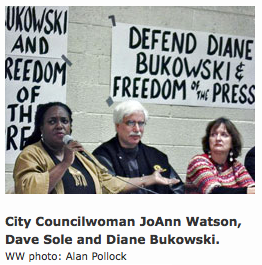Bukowski Appeal Moves Ahead, Next hearing Dec. 23
Michigan Citizen
DETROIT — Attorneys John Royal and Sharon McPhail took the first successful step toward overturning the conviction of Michigan Citizen reporter Diane Bukowski.
Her lawyers argue that Bukowski did not receive effective representation, was sandbagged at trial when the prosecutor presented a last minute witness the defense had no knowledge of, and was tried on charges dismissed at the preliminary hearing.
Bukowski was tried on charges stemming from a doubly fatal accident following a police chase of a motorcyclist and a pedestrian hit during that chase, Nov. 4, 2008.
One of the strongest issues on appeal, Royal said, was that Judge Beverly Hayes-Sipes, who presided at the preliminary hearing, dismissed all charges against Bukowski that crossing the yellow accident scene tape constituted resisting and obstructing. Hayes-Sipes bound Bukowski over only on allegations that she had physically resisted being arrested and hand-cuffed.
The prosecutor never appealed the Hayes-Sipes ruling, Royal said, yet at trial, Assistant Prosecutor Thomas Trzcinski tried her and the judge instructed the jury to consider whether she had crossed the yellow tape as constituting resisting and obstructing.
Crossing the yellow tape was an issue that was not properly before Judge Hathaway, Royal said. “No one brought that to the court’s attention. It is one basis for arguing ineffective assistance of counsel.”
Royal explained he thinks that after the prosecutor saw the Channel 2, Fox News video tape of the accident scene, which caught the arrest and handcuffing of Bukowski on tape, that there was, from his perspective, clearly no evidence of Bukowski resisting the officers.
Bukowski’s attorneys want to interview the cameraman who took the video since Judge Hathaway commented during trial, while the jury was out, that it looked to him that Fox 2 was also inside the yellow tape.
Royal and McPhail argue selective prosecution, why was reporter Bukowski prosecuted while other media outlets and reporters routinely cross the yellow line.
During trial, Prosecutor Trzcinski brought in a surprise last-minute witness, security guard Karl Scales who testified that he saw Bukowski behind the yellow tape. Neither the defendant nor her lawyer were aware of Scales’ existence. His name had not appeared in any police reports or added to the list of res gestae witnesses.
Producing Scales, without letting the defense know beforehand, is a clear violation of the law, Royal and McPhail argued.
Bukowski’s rights were also denied because she could not present to the jury her role as a reporter at the scene, could not get an extension of time to hire a new attorney after her first attorney quit, nor could the new attorney get time to adequately prepare for trial.
An affidavit from former Fox News reporter and current council president-elect Charles Pugh states that reporters routinely work behind yellow police tape.
1 Comment
Other Links to this Post
RSS feed for comments on this post. TrackBack URI

By Maranda Sydow, November 3, 2010 @ 8:41 pm
Nice blog post, just what I had been attempting to find.